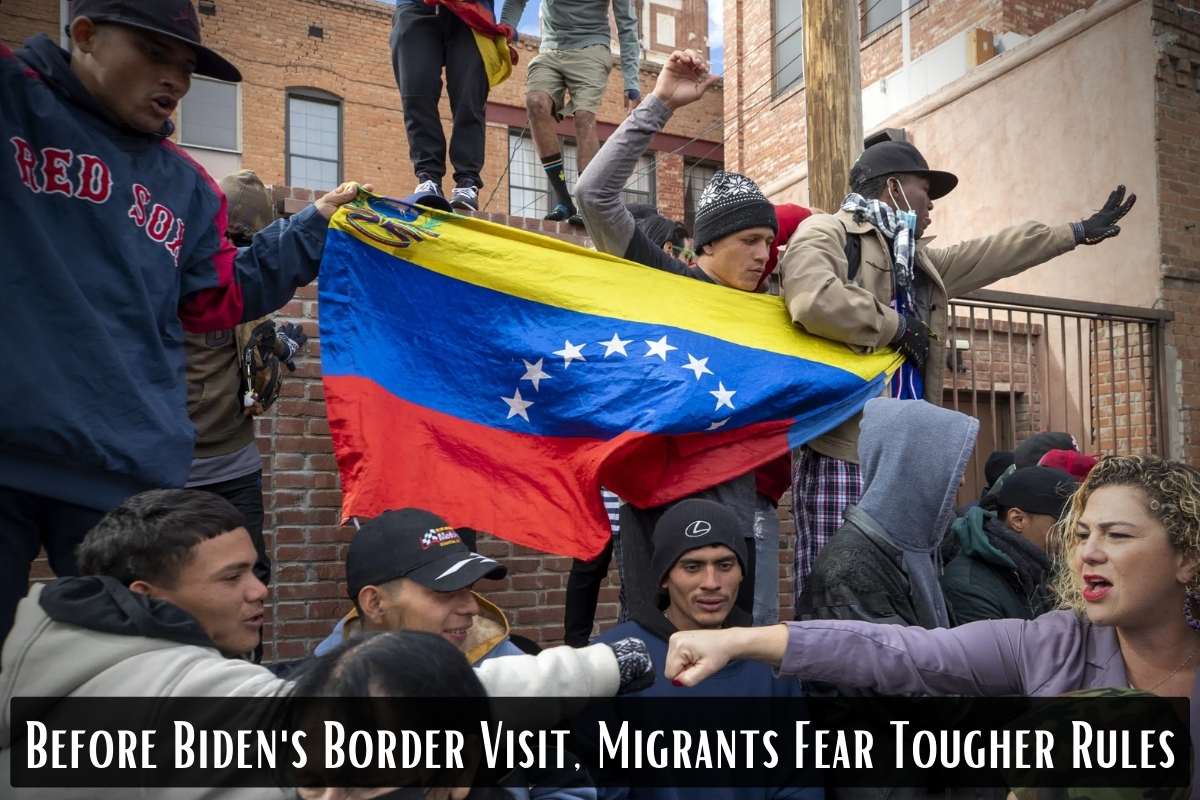On Saturday afternoon, hundreds of people marched through the streets of El Paso. When they reached a group of migrants huddled outside a church, they sang “no estan solos,” which means “you are not alone.”
Advocates say that around 300 migrants have taken shelter on the sidewalks outside of Sacred Heart Church. Some of them are afraid to go to more official shelters because of new rules that are meant to stop people from crossing the border illegally.
This is what President Joe Biden will see on his first, politically difficult trip to the southern border on Sunday. Last week, the president said that Cubans, Nicaraguans, and Haitians who enter the U.S. illegally will be sent to Mexico.
This is an expansion of a policy that started with Venezuelans last year. Under the new rules, up to 30,000 people from these four countries will be able to get humanitarian parole if they apply online and find a financial sponsor.
Border residents on Biden’s first-ever visit to the southern border:
“A little late to be doing that now.”
“A joke — I don’t think he has any interest in fixing the problems he’s created.”
“We have a border for a reason.”
“Our country needs to be secured.” pic.twitter.com/XLeP3gaw8q
— RNC Research (@RNCResearch) January 7, 2023
Biden is scheduled to arrive in El Paso Sunday afternoon. He will then go to Mexico City to meet with North American leaders on Monday and Tuesday.
Dylan Corbett, who runs the non-profit Hope Border Institute, said that there is a growing “climate of fear” in the city. He said that immigration enforcement agencies have already started sending more people to Mexico, and he can feel the tension and confusion rising. The president’s new policy builds on an effort that started in October to stop Venezuelans from trying to come to the U.S.
Corbett said that since then, a lot of Venezuelans have been left in limbo, which has put a strain on the country’s resources. He said that if these policies were applied to more migrants, their lives on the ground would get worse.
Have a look at:
- Biden Says The Wrong Day At A Ceremony Honoring Officers On January 6, But He Remembers “What Happened On July 6”
- Biden Will Mark The Anniversary Of The Big Lie On January 6
He said, “It’s a very hard situation because they can’t go forward or backward.” People who aren’t processed can’t leave El Paso because of U.S. law enforcement checkpoints. Most of them have traveled thousands of miles from their homes and refuse to give up and turn back.
Corbett said, “There will be people who need help who will be left behind.” The new restrictions on immigration are a big change that will stay in place even if the U.S. Supreme Court throws out Title 42, a public health law from the Trump administration that lets U.S. authorities turn away asylum-seekers.
El Paso has quickly become the busiest of the nine sectors of the Border Patrol along the U.S.-Mexico border. In October and November, El Paso was the busiest sector. In September, a lot of Venezuelans started coming to the border because it was relatively easy to cross, there were good shelters and bus services on both sides of the border, and there was a major airport that went to places all over the United States.
Venezuelans stopped being a big problem almost overnight after Mexico agreed on Oct. 12 to take people who crossed the border illegally into the U.S. under Title 42. Since then, Nicaraguans have filled that need. 2.5 million times, restrictions from Title 42 have been used to deny migrants their right to seek asylum under U.S. and international law in order to stop the spread of COVID-19.
El Paso rushes to remove illegal immigrants and migrant camps that are crowding downtown before Biden arrives.
Predictable.
Biden does not want America to see the chaos that he has caused on the border.
This is just a photo op and a game of pretend.https://t.co/4KJqorJjrP
— Greg Abbott (@GregAbbott_TX) January 7, 2023
In November, U.S. authorities stopped 53,247 migrants in the El Paso sector. This area covers 264 miles of desert in West Texas and New Mexico, but most of the action happens in the city of El Paso and the suburb of Sunland Park, New Mexico. The most recent monthly number for the sector was more than three times as high as the same time in 2021. Nicaraguans were by far the most common nationality, followed by Mexicans, Ecuadoreans, Guatemalans, and Cubans.
Outside of Sacred Heart Church, many people gathered under blankets. The church lets families and women in at night so that not all of the hundreds of people stuck in this limbo have to sleep outside in the cold. People could warm up in two buses and charge their phones. Food and other supplies are brought by volunteers.
Juan Tovar was holding a Bible and carrying his daughter, who was 7 years old, on his shoulders. The 32-year-old man used to drive a bus in Venezuela, but he and his wife and two daughters had to leave because of the political and economic chaos in their home country.
He said that he has friends in San Antonio who are willing to take them in. He wants to work and send his daughters to school, but he can’t leave El Paso because he doesn’t have a permit.
“Everything is in the hands of God,” he said. “We are all humans and we want to stay.” Another Venezuelan, Jeremy Mejia, 22, heard what was going on and said he had a message for the president.
Mejia said, “President Biden, I pray that God will touch your heart so that we can stay in this country.” “Please find it in your heart to help us migrants have a better life in the U.S.”
Follow us on Journalistpr.com for more news like this.

Leave a Reply